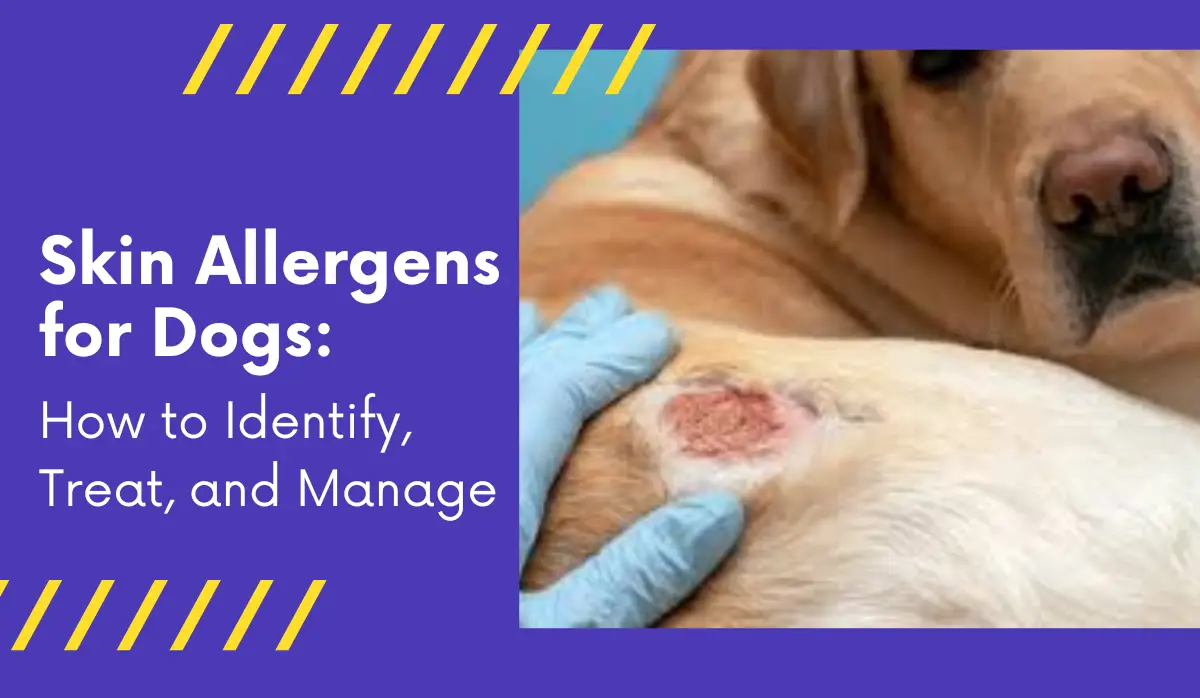Skin Allergens for Dogs: How to Identify, Treat, and Manage
By Pet Luvz on February 5, 2025

Table of Contents: Skin Allergens for Dogs
- Introduction
- Identifying Common Skin Allergens for Dogs
- Introduction to Canine Skin Allergies
- The Top 6 Skin Allergies in Dogs
- Feeding Dogs with Skin Allergies
- Treatment and Management of Dog Skin Allergies
- Best Food Options for Dogs with Skin Allergies
- Dog Allergy Treats: What to Know
- Topical Treatments and Home Remedies
- When to Consult a Vet
- Conclusion and Call to Action
Introduction
If your dog has been scratching excessively or showing other signs of discomfort, they might be reacting to skin allergens. Skin allergens for dogs can range from environmental factors like pollen and dust to food allergies. Understanding these allergens is crucial to managing your pet’s health and wellbeing. We’ll look at the reasons, signs, and practical remedies for dogs with allergies in this in-depth guide, with a special emphasis on diet—including allergy-friendly dog food.
Identifying Common Skin Allergens for Dogs

Similar to people, dogs can have a wide range of allergies. Specifically, skin allergies are often triggered by:
- Environmental allergens: Pollen, mold, and dust mites can cause atopic dermatitis.
- Food allergies: Certain proteins found in dog food, like beef, dairy, or wheat, might trigger allergies.
- Flea bites: Flea allergy dermatitis is caused by flea bites, especially the flea’s saliva.
- Contact allergens: Rubber, plastics, or other chemicals found in household items and dog accessories.
Recognizing the signs of allergies early can greatly improve the quality of life for your dog. Common symptoms include excessive itching, red or inflamed skin, bald patches, and frequent ear infections.
Introduction to Canine Skin Allergies

Skin allergies are a common ailment in dogs, causing discomfort and stress to both pets and their owners. Understanding the 6 of the most common skin allergies for dogs conditions is essential for providing relief and a good quality of life. Besides medical treatments, good food for dogs with allergies is crucial in managing these conditions effectively.
The Top 6 Skin Allergies in Dogs

Atopic Dermatitis: Skin Allergens for Dogs
Atopic dermatitis (AD) is a chronic skin condition affecting dogs worldwide. It is primarily caused by environmental allergens that penetrate the skin barrier, leading to inflammation and itching. Understanding the dynamics of this condition not only enhances the quality of life for affected dogs but also aids owners in managing their pet’s symptoms effectively.
Flea Allergy Dermatitis: Skin Allergens for Dogs
Flea Allergy Dermatitis (FAD) is one of the most vexing conditions affecting dogs of all breeds and ages. This allergic reaction is triggered by flea bites, specifically the saliva, making even a single flea a torment for a susceptible dog. Knowing what skin allergens affect your dog can help manage and potentially prevent the suffering associated with this condition. This post dives deep into what every pet owner should understand about FAD, its symptoms, causes, treatment, and preventive measures.
Food Allergies: Skin Allergens for Dogs
Food allergies can be a troublesome issue for many dog owners, manifesting mainly through skin related symptoms which can greatly affect the quality of life for your canine companion. This post delves deep into the typical food allergies that impact dogs, focusing specifically on skin allergens. By the end of this read, you’ll have a comprehensive understanding of the signs, diagnostics, management, and prevention of skin allergens that are commonly triggered by food allergies in dogs.
Contact Dermatitis: Skin Allergens for Dogs
Contact Dermatitis is a prevalent skin condition in dogs that results from direct contact with allergens or irritants in their environment. This post explores the causes, symptoms, and treatments of contact dermatitis: skin allergens for dogs, providing useful insights for pet owners looking to alleviate their pets’ discomfort.
Environmental Allergies: Skin Allergens for Dogs
If your dog develops an obsession with scratching, it can be more than a minor irritation. Environmental allergies are a common, but occasionally misdiagnosed ailment that can seriously affect your pet’s quality of life, especially skin allergies that affect dogs. This blog post will discuss the several allergens that can cause skin problems in dogs, what symptoms to look out for, and the most effective ways to treat and prevent the condition.
Secondary Infections: Skin Allergens for Dogs
Recognizing the signs of secondary infections early on can be critical in managing your dog’s health. Look out for symptoms such as:
- Excessive Scratching: Persistent scratching can indicate discomfort caused by allergens.
- Redness and Inflammation: Look for signs of skin irritation, which often appear as red and swollen areas.
- Odor and Discharge: Any unusual smell or discharge can be a sign of an infection that needs attention.
Feeding Dogs with Skin Allergies

Dog Food for Skin Allergies
Selecting the right food can significantly affect the management of skin allergies. Specialized hypoallergenic dog food often uses novel animal proteins or hydrolyzed proteins to minimize allergic reactions.
When selecting the best dog food for skin allergies, it’s crucial to understand which ingredients should be avoided and which should be included to support skin health:
AVOID:
- Common Allergens: These include beef, chicken, eggs, corn, wheat, and soy, which are known to trigger allergic reactions in some dogs.
- Artificial Additives: Preservatives, colors, and flavors can exacerbate allergies.
INCLUDE:
- Omega Fatty Acids: These are vital for skin health, helping to reduce inflammation and improve the skin’s barrier.
- Natural Ingredients: Single protein sources and limited ingredients can help minimize the risk of allergic reactions.
- Antioxidants: Ingredients like blueberries and sweet potatoes that are rich in antioxidants support skin health and general well-being.
Good Food for Dogs with Allergies

Incorporate foods rich in Omega-3 fatty acids like fish oil, which can help reduce inflammation and improve skin health. Avoiding common allergens in the diet is crucial and can greatly relieve symptoms.
Hypoallergenic Dog Foods
There are several commercial dog foods designed specifically for dogs with allergies. These foods usually contain novel protein sources or hydrolyzed proteins to minimize the risk of allergic reactions.
Ingredients to Look For
When choosing food for your allergic dog, look for high-quality ingredients with minimal additives. Novel proteins such as duck, venison, or salmon are preferable. Additionally, foods rich in fatty acids like omega-3 and omega-6 can promote healthier skin.
Homemade Diet Tips
For owners who prefer to prepare their dog’s food, it’s crucial to include ingredients that are both safe and nutritious. Consulting with a veterinarian or a pet nutritionist can ensure your home-cooked meals meet your dog’s dietary needs without triggering an allergic response.
Fresh Food for Dogs with Allergies

Fresh, homemade meals can sometimes be beneficial for dogs with allergies, ensuring that the food is free from preservatives and known allergens. Consultation with a vet is advisable to create a balanced diet.
Benefits of Fresh Food for Dogs with Allergies
Fresh food diets for dogs with allergies offer numerous advantages:
- Enhanced Nutrition: Fresh foods provide a richer array of nutrients compared to processed dog foods.
- Allergen Free: Tailored fresh diets can eliminate specific allergens that affect your dog, reducing allergic reactions.
- Improved Skin Health: Fresh diets often result in better skin health, thanks to increased moisture content and essential fatty acids.
- Boosted Immune System: A diet rich in vitamins and natural antioxidants helps strengthen the immune system, making it less sensitive to allergens.
Treatment and Management of Dog Skin Allergies

Treatment typically involves avoiding known allergens, medication to control symptoms, and possibly desensitization therapies. Regular vet visits are crucial to adjust treatment plans as needed and to ensure the dog’s diet continues to support their skin health.
Best Food Options for Dogs with Skin Allergies
Diet plays a pivotal role in managing allergies. Here we’ll outline some good food for dogs with allergies and suggest specific products known to support skin health.
Commercial Dog Food for Skin Allergies
Many pet food brands offer formulas specifically designed for dogs with allergies. These often contain:
- Hydrolyzed proteins: Smaller proteins that are less likely to trigger a reaction.
- Limited ingredients: Fewer components mean fewer triggers for allergies.
- Novel proteins: Ingredients like kangaroo or venison that are less likely to cause reactions.
Homemade Dog Food Recipes
For those preferring a homemade approach, consider recipes that use:
- Novel protein sources: Such as pheasant or duck.
- Non-traditional carbohydrates: Like sweet potatoes or peas.
- Supplements: Adding omega-3 fatty acids or coconut oil can improve skin health.
Always consult with a vet before changing your dog’s diet especially when dealing with allergies.
Dog Allergy Treats: What to Know

Treats for dogs with allergies should avoid common allergens while still being appetizing. Options like Blue Buffalo Natural Veterinary Diet hypoallergenic treats or homemade pumpkin and oat treats can be safe choices. Always read labels and consult your vet with questions.
When it comes to our furry friends, seeing them in discomfort from allergies can be distressing. Dog allergy treats, specifically formulated to alleviate allergic reactions, can provide significant relief. Understanding these treats, alongside knowing about common skin allergens for dogs, can empower you to better care for your pet.
Identifying Dog Allergies
Before diving into the world of allergy-specific treats, it’s crucial to identify whether your dog is indeed suffering from allergies. Symptoms often include:
- Excessive scratching or licking
- Red, inflamed skin
- Chronic ear infections
- Sneezing, coughing, or wheezing
If you observe any of these symptoms, a visit to the vet is recommended to confirm if they stem from allergies and to discuss potential dietary adjustments.
Topical Treatments and Home Remedies

Besides dietary management, topical treatments can soothe allergic reactions:
- Medicated shampoos: Ingredients like oatmeal and aloe vera can reduce itching and inflammation.
- DIY rinses: Natural solutions like chamomile tea baths or apple cider vinegar sprays may help soothe irritated skin.
When to Consult a Vet
If symptoms persist despite your best efforts at home care, it’s crucial to consult a veterinarian. They may recommend:
- Allergy testing: To identify specific allergens.
- Prescription medications: Such as steroids or antihistamines.
- Immunotherapy: Long-term treatment for desensitizing against allergens.
You should consult a veterinarian if:
- Symptoms Persist or Worsen: If your dog’s condition does not improve with initial treatments.
- Behavioral Changes: Such as increased aggression, which could indicate discomfort.
- No Clear Diagnosis: If you’re unsure what’s causing your dog’s symptoms.
Conclusion and Call to Action: Skin Allergens for Dogs
Dog skin allergies must be managed carefully, taking into account your dog’s individual demands, particularly with regard to nutrition. Keep in mind that each pet is different, so what suits one may not suit another. Discuss any new treatments or diet changes with your veterinarian to ensure they’re safe and effective for your furry friend.
Have you found effective ways to manage your dog’s skin allergies? Share your experiences below and help other pet owners!
Sign up for our newsletter for more pet care tips
YOU MAY ALSO LIKE
Top Pick
-

7 Proven Benefits of Fresh Pet Dog Food for Daily Health
January 11, 2026
-

African Grey Parrot: A Smart, Loving, and Talkative Companion
July 22, 2025
-

5 Best Canister Filters for Crystal Clear Water in Your Pet Fish Tank
July 8, 2025
-

Is Pumpkin Good for Cats? Everything You Need to Know
July 5, 2025
-

Swim Bladder Treatment: Solutions for Aquarium Fish Health
July 3, 2025











